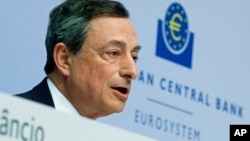European Central Bank head Mario Draghi let rattled investors know Thursday that the bank is poised to take action as soon as its next monetary policy meeting in March if plunging oil prices and the market turmoil threaten the economy.
At a news conference Thursday, Draghi underlined his willingness to expand existing stimulus efforts, saying several times that there was "no limit'' to measures it might take.
As expected, the 25-member ECB governing council left its key interest rates untouched Thursday and didn't ramp up its existing 1.5 trillion-euro ($1.63 trillion) monetary stimulus program.
At its March 10 meeting, however, the bank that sets monetary policy for the 19 nations who use the shared euro currency will have a new set of staff estimates about the future course of inflation.
That could be fodder for a possible shift to do more to push up inflation in the eurozone, which is now considered way too low at 0.2 percent annually. Oil has fallen from around $45 per barrel since the bank's Dec. 3 meeting to around $28 per barrel.
Risk of low inflation
Draghi indicated the drastic recent falls in oil prices have increased risks that inflation will stay too low. The bank's goal is just under 2 percent, a level considered healthiest for the economy.
"It will therefore be necessary to review and possibly reconsider our monetary policy stance at our next meeting in early March,'' he told reporters in Frankfurt, Germany.
"What was expected to be a dull first meeting of the year turned out to be an exciting ECB meeting with ECB president Mario Draghi opening the door widely for new ECB action in March,'' wrote analyst Carsten Brzeski at ING-DiBa. "While today's ECB meeting will again feed bold speculations about what could happen in March, the question remains whether Draghi will really be able to deliver on his promise.''
The bank made a similar statement in October before increasing stimulus on Dec. 3. The increase, however, was less than markets had expected, and shares sagged in its wake. Draghi issued a mild caution against exaggerated expectations this next time.
He said he "abstained from blaming markets as such,'' adding, "and why is that so? Because communication is a two-way affair. So it's very hard to put the blame of some disappointment on one side only.''
He didn't offer hints about the exact tools he bank might choose.
The steep drops in the oil price, coupled with worries that the world can't rely anymore on China for strong growth, have shaken markets since the start of 2016.
The ECB is on the opposite path from the U.S. Federal Reserve, which has already begun withdrawing stimulus. Last month, the Fed made its first interest rate increase in seven years.
Internal disagreements
Disagreements among members of the 25-member ECB governing council could be an obstacle to further stimulus. At the December meeting, some wanted more stimulus while others wanted none at all. That presents a challenge to Draghi's ability to persuade a broad majority to back any more stimulus, if he decides that's the way to go.
Draghi addressed that issue by saying the council was "unanimous'' in issuing its statement about revisiting stimulus in March.
"No one should doubt'' that the council has the "cohesion'' needed to act, he said.
At the Dec. 3 meeting, the ECB governing council expanded an existing stimulus program based on 60 billion ($66 billion) in monthly purchases of government and low-risk private sector bonds by extending the purchases for another six months through March 2017. The purchases are made with newly-created money, so they increase the amount of money in the financial system and in theory should boost inflation and also lending to support business.
Last month council also cut the interest rate on deposits at the central bank from commercial banks by 0.10 percentage points to negative 0.30 percent. The idea is to make banks pay for leaving money unused and push them to lend it instead.
Weak inflation is a sign of a sluggish economy, and falling prices can hurt growth if they become entrenched. The ECB focuses on inflation because that's its legal mandate under the European Union agreements that established the euro.
Central bank stimulus can have far-reaching effects on businesses, investors, savers and consumers. The ECB stimulus has meant a stronger dollar against the euro, adding a headwind for U.S. exporters to Europe. It has also slashed returns on savings in conservative investments such as bonds, insurance policies and bank accounts for people looking ahead to retirement.
Stimulus can, however, boost stocks by reducing returns on other investments such as bonds to zero or even below.




